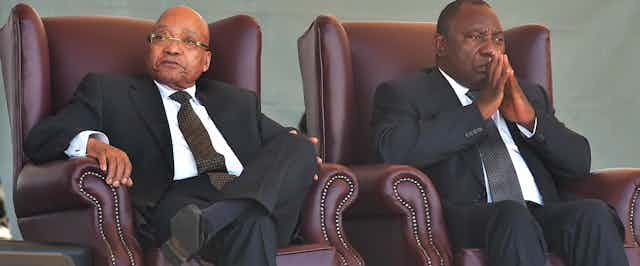South Africa’s ruling party, the African National Congress (ANC), glossed over the causes of what nearly degenerated into a political crisis following its momentary affray with former president Jacob Zuma over his removal from office.
That he has now gone doesn’t mean the country’s democracy is out of danger.
This is because the problem wasn’t necessarily Zuma, but a party system that has unwittingly begun to institutionalise aberrations from the country’s Constitution. The aberration – and the practice that upended the constitution – is that getting rid of the president of the party necessitated the president of the Republic being recalled.
This isn’t what should happen. The power to remove the president of the country lies with the parliament, which elected him from among the members of the national assemby. A recall from the position of party president is a party political process not catered for in the Constitution. That’s why it only has political rather than legal effect. This means that if the president had refused to resign after the party had asked him to go, the only way to remove him would have been through the prescribed parliamentary processes.
What in fact happened was that the party political process of a recall held sway over the constitution’s prescription on how a president should be removed. This is because the ANC’s decision, to recall a president before his term ends is, in essence, a political decree to him to resign. This cannot be defied for fear of the ignominy of a motion of no confidence in parliament.
This process runs against the spirit of South Africa’s constitutional democracy. And the bigger problem is that this is increasingly becoming the norm rather than the exception.
Nine years ago the ANC recalled Thabo Mbeki before his term as head of state ended. An important question asked at the time – a question that the ANC didn’t follow up even in its policy discussions – was the inconsistency of the party political processes with the provisions of the Constitution on the removal of the president. The party’s National Executive Committee was determined to have Mbeki removed, at whatever cost. He graciously obliged, and tendered his resignation to obviate the possibility of political crisis. But this set a wrong precedent.

Zuma suffered the same fate. It’s not that he shouldn’t have left before his term ended. What’s at stake here is the timing and the way in which it was done. The ANC should have removed Zuma a long time ago. It shouldn’t have waited for its elective conference to choose new leadership and then to use this as an opportunity to recall him.
Zuma, even in the final hours before he finally resigned, kept on insisting that he be told the reasons for his recall. This was not off the mark. The ANC had obfuscated on the issue and never made the reasons public. What’s clear is that Zuma was recalled as the president of the Republic, not because he had abrogated the duties of the highest office, but because he was no longer the president of the ANC.
This is a dangerous political trend.
Blurring the lines between the state and party
Ramaphosa’s presidency is destined to the same fate as long as the ANC continues to skate over this political subterfuge based on the false notion of “two centers of power” – the situation in which there’s one person running the country while another runs the party. The ANC has twice used this as the basis for resorting to party political processes to remove a president of the country.
This narrative first became prominent at the ANC conference in Polokwane in 2007 and was used to cut short Mbeki’s tenure to smooth Zuma’s path to power. The removal of Mbeki – who was no longer the president of the ANC at the time – exemplified the rapaciousness that had come to corrupt the ANC’s value system. It showed that the hideous phenomenon of “it’s our turn to eat” had been institutionalised. Ten years later Mbeki was to decry this phenomenon.
Events unfolded as they did because of a belief in the ANC that party political positions are necessarily state positions. In other words, those who hold certain political positions in the party are entitled to state positions.
History is repeating itself
There are already signs that this kind of thinking is far from dead. This has become evident in the commentary around Ramaphosa’s anticipated cabinet reshuffle. Some are saying that David Mabuza, premier of one of the country’s provinces, should become the deputy president of the republic simply because he is the deputy president of the ANC.
This is a strange argument. And as part of its renewal the ANC should disabuse itself of this kind of thinking. The power to appoint the deputy president and ministers resides with the president, who is elected by members of the national assembly.
The position of the president of the Republic belongs to the state, not the ANC. It is not the ANC’s – even though the president of the country and the president of the ANC may be occupied by the same person.
The danger the governing party poses to democracy is that it continues to blur the lines between the state and the party. This is particularly true when it comes to changing the president of the republic before the end of the electoral term as happens when the ANC decides to recall the party’s president.
This way of doing things is fixed in the ANC’s political parlance. The party may be too stubborn to erase it. But it threatens the future of South Africa’s constitutional democracy.

